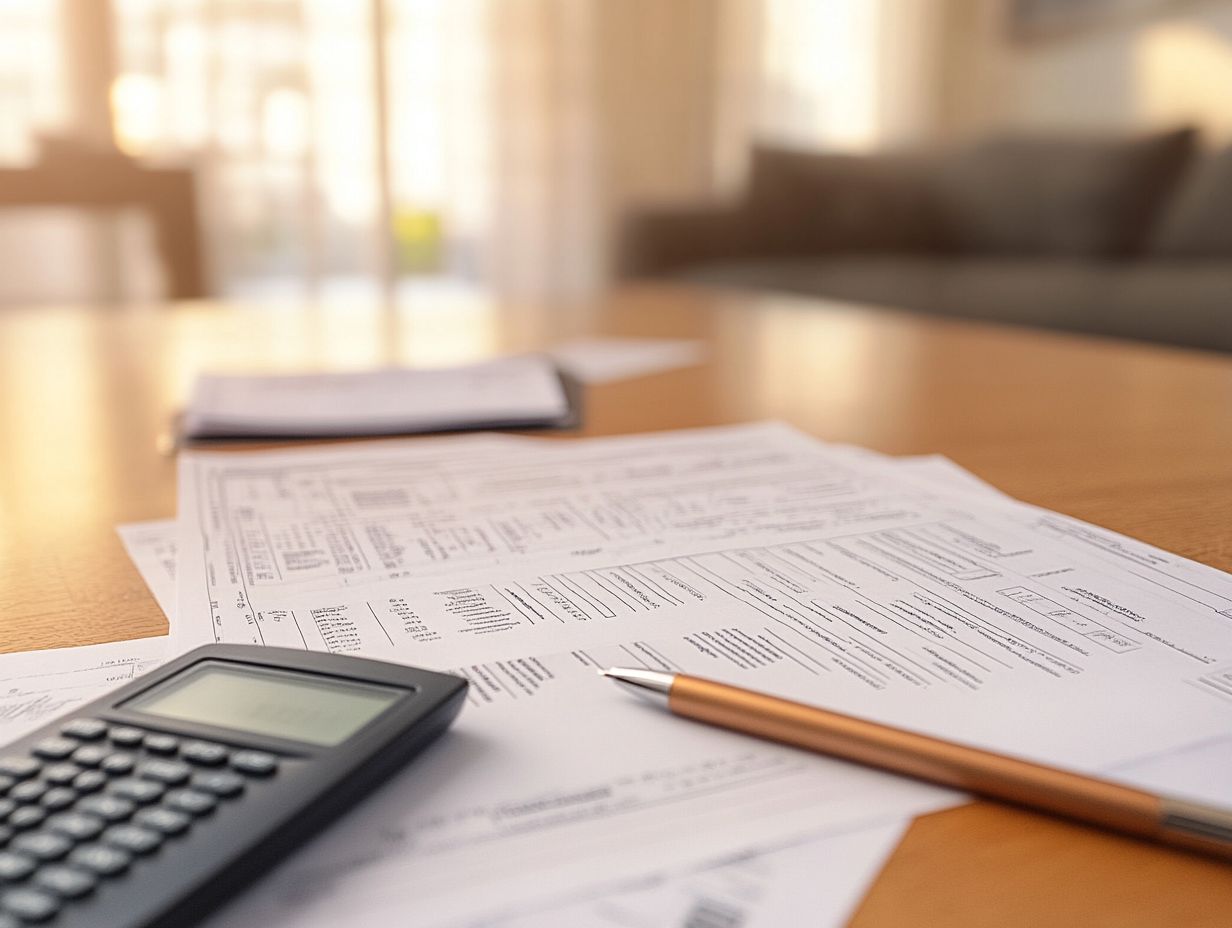5 Essential Documents for Mortgage Applications
Navigating the mortgage application process can feel like a daunting task, especially with the multitude of requirements you must meet.
Whether you re a first-time homebuyer or seasoned in the game, grasping the essential documents necessary for a successful application is vital. From proof of income and bank statements to identification documents, each piece contributes significantly to your application s strength.
This article will guide you through the key documents you ll need, explore various mortgage types, and offer valuable tips to enhance your chances of approval! Let s dive in to streamline your journey toward homeownership!
Contents
- Key Takeaways:
- 1. Proof of Income
- 2. Bank Statements
- 3. Tax Returns
- 4. Credit Report
- 5. Identification Documents
- What Are the Different Types of Mortgages Available?
- What Documents Are Required for Self-Employed Individuals?
- What Are the Possible Delays in the Mortgage Application Process?
- How Can a Business Maximize Its Chances of Getting Approved for a Mortgage?
- What Are the Common Mistakes to Avoid in a Mortgage Application?
- Frequently Asked Questions
- 5 Key Documents for a Mortgage Application
- Why is proof of income necessary for a mortgage application?
- What is considered valid proof of employment for a mortgage application?
- Why are tax returns required for a mortgage application?
- How many months of bank statements are needed for a mortgage application?
- Why is identification necessary for a mortgage application?
Key Takeaways:

Provide proof of income, such as pay stubs or W-2 forms, to demonstrate financial stability and ability to repay the mortgage.
Have bank statements and tax returns ready to show a steady flow of income and responsible financial management.
Check and monitor credit reports to ensure accuracy and address any issues before submitting a mortgage application.
1. Proof of Income
Proof of income is a key part of your mortgage application journey, helping lenders understand your finances and determine your borrowing capacity for home loans, whether that s FHA loans, VA loans, or conventional loans.
This documentation is essential for ensuring a seamless application process and securing loan approval. Typically, proof of income includes a range of documents like pay stubs, tax returns, and bank statements, each illuminating different aspects of your financial health.
Lenders closely examine these documents to understand your finances and assess the stability of your income and the reliability of your cash flow. This provides insights into your ability to manage monthly payments.
For example, your pay stubs showcase your ongoing wages, while your tax returns offer a broader view of your annual earnings. Meanwhile, bank statements can reveal consistent deposits and account balances.
For first-time homebuyers, presenting accurate and comprehensive income verification is crucial. It plays a significant role in influencing lending decisions and can greatly streamline the approval process.
2. Bank Statements
Bank statements play a crucial role in assessing your financial health during the mortgage application process. They offer lenders valuable insights into your cash reserves, sources of income, and spending habits, enabling them to make well-informed decisions.
By providing updated bank statements, you reflect your current income trends and ongoing expenses. Lenders can gain a clearer understanding of your financial stability and reliability through these documents.
A review of direct deposits is particularly important as it verifies your primary income stream. Additionally, the overall activity in your accounts can unveil spending patterns that showcase either financial discipline or potential red flags.
This thorough analysis allows lenders to determine whether you have the capacity to manage future loan repayments effectively, fostering a deeper understanding of your financial behavior.
3. Tax Returns
Tax returns are essential for proving your income during the mortgage application process. They help lenders assess your financial stability over time through consistent reporting of your earnings and tax obligations.
These returns hold particular significance depending on your work situation. If you’re an employee, you ll typically rely on W-2 forms that detail your annual income. On the other hand, freelancers or independent contractors will use 1099 forms to report earnings from various clients.
Together, these documents paint a comprehensive picture of your financial landscape. They enable lenders to evaluate the consistency and reliability of your income, whether you re traditionally employed or self-employed.
This verification process not only aids in the lending decision but also gives you the power to understand your financial standing and potential mortgage affordability.
4. Credit Report

A credit report is an important document in your mortgage journey. It gives lenders a clear view of your credit history.
This information helps determine your debt-to-income ratio, which influences approval for mortgage options like USDA and jumbo loans.
You can obtain your credit report for free once a year from each of the three major credit bureaus. It typically includes details like your credit accounts, payment histories, outstanding debts, and public records such as bankruptcies or liens.
Reviewing your report is crucial. It helps you assess your financial health and identify areas for improvement.
- Pay down existing debts.
- Make timely bill payments.
- Correct any inaccuracies in your reports.
These measures can lead to better interest rates and more lending options.
5. Identification Documents
Identification documents are crucial in the mortgage application process, and following the 5 steps to take before applying for a mortgage can help establish your identity and eligibility.
These documents include government-issued photo IDs like driver’s licenses or passports. You’ll also need your social security number and proof of residency, typically shown through utility bills or lease agreements.
Lenders examine these documents to reduce fraud risks. This ensures your legitimacy as a borrower and protects against identity theft.
Make sure to have these documents ready to streamline your application!
What Are the Different Types of Mortgages Available?
Understanding the types of mortgages is vital for potential homebuyers. Options include FHA loans, VA loans, USDA loans, and conventional loans.
Each type has distinct features, eligibility requirements, and benefits tailored to various financial situations.
FHA loans are designed for first-time homebuyers and those with lower credit scores. They offer lower down payment requirements and easier approval.
VA loans are for veterans and active military personnel, providing benefits like no down payment and competitive interest rates.
If you’re in a rural area, USDA loans offer 100% financing for eligible low-to-moderate income homebuyers. Conventional loans target borrowers with good to excellent credit but usually require a substantial down payment.
Each mortgage type opens doors to homeownership and presents unique advantages based on your financial situation.
What Are the Requirements for a Mortgage Application?
Requirements for a mortgage application vary based on the loan type and lender. You’ll need to gather documents like proof of income, credit reports, and other financial records, along with understanding the 5 key elements of a mortgage agreement.
It’s essential to maintain a healthy credit history. Lenders consider credit scores when evaluating potential borrowers.
A strong credit score boosts your chances of approval and can lead to better interest rates. Lenders also review your debt-to-income ratios, employment stability, and savings for down payments.
By preparing all necessary documents, you enhance your chances of a successful mortgage application.
What Documents Are Required for Self-Employed Individuals?

Self-employed individuals face unique challenges during the mortgage application process. You’ll need to provide specific documentation, such as tax returns and bank statements, to demonstrate your income and financial stability. These factors can differ significantly from those of traditionally employed borrowers.
Understanding these nuances is crucial. While employment verification typically revolves around W-2 forms, self-employed borrowers must present two years of tax returns. These documents show your earnings and expenses.
Detailed profit and loss statements are also important. They help mortgage lenders assess your business’s ongoing viability. Bank statements are crucial too; they substantiate your income flow and savings.
This comprehensive suite of documentation showcases your financial habits and enhances your credibility. Ultimately, it assists you in securing more favorable loan terms.
What Are the Possible Delays in the Mortgage Application Process?
Delays in your mortgage application can stem from various factors, such as incomplete documentation and complications with credit reports. These elements can extend the timeline for your loan approval.
Complications often arise from missing pay stubs or discrepancies that may raise concerns during the review. Slow responses on your part can further aggravate these delays.
To streamline your application process, gather all necessary documentation upfront, keep open lines of communication with your lender, and address any questions promptly. Establish a clear timeline and follow up regularly to keep your mortgage application on track.
How Can a Business Maximize Its Chances of Getting Approved for a Mortgage?
Want to boost your chances of mortgage approval? Here s how to prepare! Start by organizing your financial documents and maintaining a healthy credit history. Demonstrating sufficient cash reserves is vital in convincing lenders of your ability to handle finances.
Develop a strong business plan that outlines your future strategies and revenue projections. Regularly reviewing and updating your financial statements ensures all critical information is readily available.
Engage in proactive communication with lenders. Address any concerns and clarify your business objectives to foster trust. By presenting a comprehensive approach to financial management, you can effectively make your case for securing the necessary funding.
What Are the Common Mistakes to Avoid in a Mortgage Application?
Common mistakes can significantly impede your mortgage approval process. Inadequate documentation and a poor credit history can lead to unnecessary delays.
As you pursue homeownership, understand the importance of your application details. Gathering tax returns and bank statements ahead of time is crucial.
Failing to review your credit reports might uncover unwelcome surprises that you could have addressed in advance. Misunderstanding lender requirements can also make your journey feel challenging.
To avoid these pitfalls, thorough preparation is key. Seek guidance, educate yourself about credit protocols, and comply with all lender stipulations for a smoother path toward securing your mortgage.
Frequently Asked Questions

This section addresses common queries about the mortgage application process. Whether you’re self-employed or a traditional borrower, you ll find helpful insights here.
5 Key Documents for a Mortgage Application
Gathering the right documents is crucial for a smooth mortgage application process. To ensure everything goes smoothly, check out what documents you need for a mortgage; you’ll need five important documents:
- Documents that show how much money you earn
- Proof of employment
- Tax returns
- Bank statements
- Identification!
Why is proof of income necessary for a mortgage application?
Proof of income shows the lender your ability to repay the mortgage. This can include pay stubs, W-2 forms, or a letter from your employer.
What is considered valid proof of employment for a mortgage application?
Valid proof of employment includes a letter from your employer, recent pay stubs, or a signed contract. It should detail your job title, length of employment, and salary.
Why are tax returns required for a mortgage application?
Tax returns provide a comprehensive view of your income and financial stability. Lenders typically request the past 2-3 years of tax returns.
How many months of bank statements are needed for a mortgage application?
Lenders usually ask for the last 2-3 months of bank statements to verify your income, expenses, and overall financial health.
Why is identification necessary for a mortgage application?
Identification verifies your identity and ensures you are who you say you are. This can be a driver’s license, passport, or other government-issued ID.






